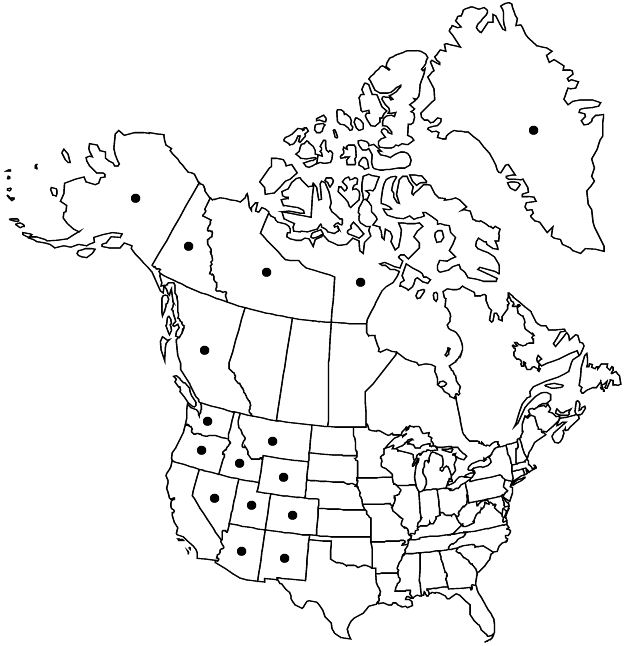Geum rossii
in A. P. de Candolle and A. L. P. P. de Candolle, Prodr. 2: 553. 1825.
Plants subscapose. Stems 4–28 cm, glabrous or downy, hairs to 1 mm, sometimes septate-glandular. Leaves: basal 3–13 cm, blade pinnate to interruptedly pinnate, major leaflets 13–26, alternating with 0–14 minor ones, terminal leaflet slightly larger than major laterals; cauline 0.7–2 cm, stipules adnate to leaf, indistinguishable from pair of lobes, blade bractlike, not resembling basal, alternate, simple, pinnatifid to 3-fid. Inflorescences 1–3 (–4) -flowered. Pedicels woolly, sometimes glandular. Flowers erect; epicalyx bractlets 1.5–7 mm; hypanthium green, slightly purple-tinged to strongly purple; sepals erect to erect-spreading, 3–10 mm; petals spreading, yellow, obovate to nearly orbiculate, 5–12 (–17) mm, longer than sepals, apex broadly rounded to irregularly emarginate. Fruiting tori sessile, glabrous. Fruiting styles wholly persistent, not geniculate-jointed, 2–5 (–10) mm, apex not hooked, glabrous throughout or pilose only at base. 2n = 56.
Phenology: Flowering summer.
Habitat: Alpine and arctic tundra, rocky slopes, often in gravelly or peaty soil
Elevation: 0–4000 m
Distribution

Greenland, B.C., N.W.T., Nunavut, Yukon, Alaska, Ariz., Colo., Idaho, Mont., Nev., N.Mex., Oreg., Utah, Wash., Wyo., e Asia (Russian Far East)
Discussion
The variability accommodated here in Geum rossii was distributed by earlier monographers such as P. A. Rydberg (1913b) and F. Bolle (1933) among a half dozen species. W. Gajewski (1957) reduced them to two species, G. rossii and G. turbinatum; most recent taxonomists have recognized the two taxa as subspecies or varieties of a single species. The large geographic discontinuity between the Rocky Mountain and arctic ranges makes it easy for those wishing to follow this tradition. No one morphologic character or combination of characters neatly separates the arctic plants from those of the Rockies.
Where their ranges overlap in Alaska, Geum rossii hybridizes with G. calthifolium to form sterile plants known as G. ×macranthum (Kearney ex Rydberg) B. Boivin; see discussion under 4. G. schofieldii.
Selected References
None.
Lower Taxa
"thin" is not a number."elongating" is not a number. "elongating" is not a number.